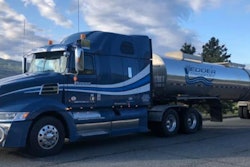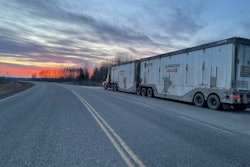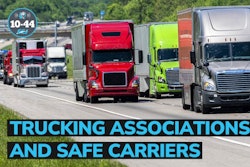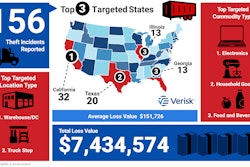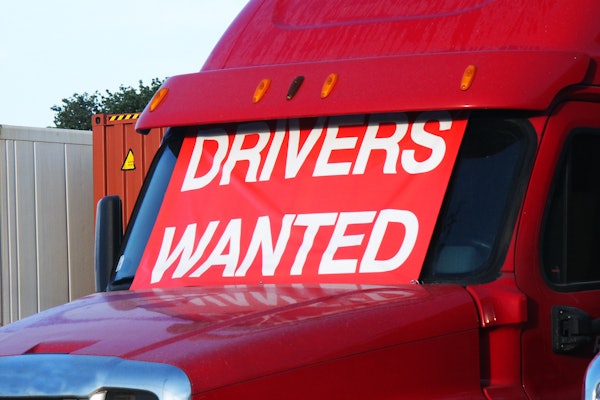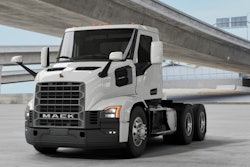Several large trucking companies narrowly avoided their workers going on strike earlier this summer by reaching deals with the Teamsters union before their previous contracts expired.
Now, the automotive industry in the U.S. is facing a potential worker strike if deals can’t be struck by the end of the day Thursday, Sept. 14. The big three auto makers in Detroit -- General Motors, Ford and Stellantis -- each have contracts expiring with the United Auto Workers union. The union is seeking increased wages, the restoration of cost of living adjustments, the reestablishment of medical benefits for retirees and more.
Joining Jason and Matt this week is Douglas Kent, executive vice president of Strategy and Alliances at the Association for Supply Chain Management, who gives an update on the talks between the union and the automakers in the days leading up to the expiration of their contracts.
Contents of this video
00:00 10-44 intro
00:30 UAW strike
01:20 Association for Supply Chain Management
02:57 UAW contract negotiations
04:03 Complications for negotiations
07:10 Economic impacts of UAW strike
08:40 Impacts on the transportation industry
10:29 Government brokered deal
12:21 Contingency plan for UAW strike
Jason Cannon:
This week's 10-44 is brought to you by Chevron Delo 600 ADF ultra-low ash diesel engine oil. It's time to kick some ash.
Matt Cole:
What a strike by UAW at Ford, GM and Stellantis could mean for the economy and the transportation industry.
Jason Cannon:
You're watching CCJ's 10-44, a weekly webisode that brings you the latest trucking industry news and updates from the editors of CCJ. Don't forget to subscribe and hit the bell for notifications so you'll never miss an installment of 10-44.
Hey everybody, welcome back. I'm Jason Cannon and my co-host on the other side is Matt Cole. Several large trucking companies narrowly avoided worker strikes this summer after they reached deals with the Teamsters Union before the previous work contract expired. Now the automotive industry in the US faces a potential worker strike if deals can't be struck by the end of the day, September the 14th.
Matt Cole:
The big three automakers in Detroit, General Motors, Ford and Stellantis each have contracts expiring with the United Auto Workers Union. The union is seeking increased wages, the restoration of cost of living adjustments, the reestablishment of medical benefits for retirees and much more. Joining us this week is Douglas Kent, Executive Vice President of Strategy and Alliances at the Association for Supply Chain Management, who gives an update on talks between the union and the automakers in the days leading up to the contracts' expiration.
Douglas Kent:
We're the Association of Supply Chain Management, so we're the largest nonprofit association focused on supply chain in the world. We operate across over 100 countries, we have about 45,000 members across a broad range of industry sectors. And then we are primarily interested in ensuring that the talent to development necessary to keep the supply chain operating successfully is there and also assisting large corporations in making the transitions necessary for sustainability and digital advancement, et cetera.
Well, it seems to be a bit of a stalemate at the moment, yet to be seen. Of course, we are seeing a replay of some of the things that have happened recently across the industry sector with what was happening with UPS, for example, what happened with Yellow. So sometimes these things do tend to have somewhat of a viral impact. But this not an unknown condition, there is a contract that exists and that contract is expiring. When we reach those expiration dates, they start getting a little closer, then the union starts to make its demands well known and starts to negotiate with the players. In this case, the larger three of the automobile manufacturers in the US. So the conditions that are being asked for are transparent, but they are also concerning in terms of being able to reach an agreement because obviously this is a sector that is already a bit stressed and has undergone a lot of stress and a lot of disruption over the course of the last few years.
Jason Cannon:
As of a week prior to the contracts expiring, Douglas said all indications were that the union and the companies were still pretty far apart in their negotiations.
Douglas Kent:
Nobody wants it to happen, I think that's clear. I think even the workers don't want it to happen because it impacts their own livelihoods. The companies don't want it to happen, the government doesn't want it to happen. This is a major GDP impacting factor. We clearly saw that when we had production issues relative to the chip shortage problem and its impact on the GDP. So economically we don't want it to happen. Each of the companies, I think, are bringing forward their views. They're not completely transparent on where they are relative to their individual discussions, but it still seems like we're pretty far apart from being able to reach an agreement. So that obviously continues to elevate the concern. We saw a similar thing with UPS and we thought they were quite far apart and they did come together in the end. Whether that will happen here, difficult to say, of course, because we are not so informed about how far the differences are.
Matt Cole:
One complicating factor around the UAW negotiations is that the union is trying to negotiate with three separate companies who also happen to be competitors with each other instead of a one-on-one negotiation like trucking saw earlier this summer with the Teamsters and UPS, ABF Freight and others. Because there are three separate contracts in play, there's also a chance that a deal gets worked out at one company before another.
Douglas Kent:
I think the complication here, of course, is that you've got three different players who are competitors, let's not forget that. So these three manufacturers of automobiles compete against each other, so they don't show their cards as openly because they also are competitors. So I think this one's a little bit more difficult, I think it represents a relatively high likelihood that it would occur. And if it does indeed happen, then the big question is for how long will that stalemate still be there? And when can we reach resolution? And what's the impact during the time period of which the strike does continue?
Here you've got three companies, which makes it certainly much more complex from a negotiation standpoint, but also these three competitors. So one folds, the other doesn't. What kind of pressure does that provide? What is one company willing to do versus others? Yeah, I think this is going to be going to be complex. I would guess that there is every potential that they could come to an agreement with one and not the others. It certainly has that potential because these companies aren't going to be so open with their own individual negotiations as well because they're sitting in this competitive environment. So I think there's a potential map for that to happen and we reach an agreement with one and not the others and there's every potential that we don't reach an agreement with all three.
Jason Cannon:
The automotive sector represents about 3% of the US GDP, so a labor stoppage at the big three would have a sizable impact. Douglas explains what those impacts could be after a word from 10-44 sponsor, Chevron Lubricants.
Protecting your diesel engine and its aftertreatment system has traditionally been a double-edged sword. The same engine oil that is so essential to protecting your engine's internal parts is also responsible for 90% of the ash that is clogging up your DPF and upping your fuel and maintenance costs. Outdated industry thinking still sees a trade-off between engine and emission system protection and Chevron was tired of it. So they spent a decade of R&D developing a no compromise formulation. Chevron Lubricants developed a new ultra-low ash diesel engine oil that is specifically designed to combat DPF ash clogging.
Delo 600 ADF with OMNIMAX technology cuts sulfate ash by a whopping 60%, which reduces the rate of DPF clogging and extends DPF service life by two and a half times. And just think what you can do with all the MPGs you're going to add from cutting your number of regions. But Delo 600 ADF isn't just about after treatment. It provides complete protection, extending drain intervals by preventing oil breakdown. Before you had to choose between protecting your engine or your after treatment system and now you don't. 600 ADF from Delo with OMNIMAX technology, it's time to kick some ash.
Douglas Kent:
I think there's two things we're concerned about. Of course, the automobile sector represents about 3% of the economy and depending on who you talk to, the optimist or not, we're already in a pretty fragile position relative to the economic situation. And then of course, that has its own impacts and what does that mean in terms of the GDP impact that that has because every day is a multimillion dollar loss in the economy. And we shouldn't forget that.
And then of course, there's also concern on the consumer impact side. What does a higher cost of goods? Because the automobile is made up of two primary cost factors and that's labor and direct materials. The direct material side, of course, is higher than the labor side, but any increase in the labor force if the organizations want to hold profitability at the same level would mean a consumer increase in pricing. Average automobiles right now running about, I think, around $48,000, which is a big pill to swallow already. So you're always concerned about keeping the balance of maintaining profitability, being able to pay the workers a fair wage, but then also not inadvertently decreasing demand because you've raised prices at a level where consumers no longer want to buy the product. So those things are difficult things to balance in this situation.
Matt Cole:
Douglas says a UAW strike could also have big impacts on the transportation segment of the economy, even beyond trucking companies whose bread and butter is the automotive industry.
Douglas Kent:
Obviously we're very concerned about that. The transportation of goods is of course on the rise. The road shipments are particularly on the rise. We already have a global shortage of truck drivers. So if you compound an increase in the need for road shipments, combined with a decrease in the availability of workforce and truck drivers and then you bring on, and by the way, we also don't have vehicles. It's a pretty compounded problem. And of course, one of the things that we know already is that there's not been a decrease that might've been expected in e-commerce, which is driving a lot of that shipment volume, that we might have expected after the pandemic ceased. That return back to brick and mortar shopping didn't happen, e-commerce is still at record highs, returns are also at record highs, so we don't see the demand for road shipments going down, we actually see it going up.
Our recent report that we did with KPMG, we'd take a look at what we call our Supply Chain Stability Index in partnership with KPMG, and in one of our recent reports, we also noted for the first time in 20 years that the volume of shipments coming up through the Laredo border on road were actually higher than incoming shipping volumes coming in through LA Long Beach ports. So again, this is just illustrating the fact that the crossover impact to the transportation network is certainly going to be impacted with any prolonged negotiation or strike activity from the Auto Union.
Jason Cannon:
Now, if a strike has a big enough potential impact on the economy and the workforce as a whole, sometimes the federal government will step in to broker a deal.
Douglas Kent:
Unions don't like that very well. So we saw that also in the rail situation. That's also where the government did step in and assist in brokering the deal. I think you'll recall that when the UPS activity was happening, they were asking the government not to step in, "Let us manage ourselves. We're all adults here." But I think, yeah, because of the GDP impact, I would say the likelihood of the government needing to step in if it was prolonged is relatively high. Again, I just think you have to look at it from the pure economic side saying, you may not want me to be involved in your affairs and negotiations, but you're also impacting the economy at the same time.
So I probably wouldn't think that the government is going to step in before the deadline, but if the strike happens, I think we might see an increased level of intervention and activity in order to help bring it to resolution. I mean, this is 140,000 workers we're talking about as well. So the government would have to also be thinking about, what does that mean in terms of unemployment? And what could happen relative to that? Again, we're already under a relatively... We have macro concerns about the economy in general and we have macro concerns about global workforce [inaudible 00:12:43] relative to supply chain. So those things in combination should make everyone concerned and therefore, I think the likelihood of governmental intervention, if it does pass the deadline and there is no agreement, is relatively likely.
Matt Cole:
In the case of a strike, Douglas said he hopes companies that could be impacted, including those in trucking, have a plan for how to manage.
Douglas Kent:
I think if you're sitting back and praying and having mercy, I think you're probably not taking the right strategic steps forward. I'm hoping that all who have the potential to be impacted, the suppliers to the sector, those who are managing, are buying and maintaining fleets. I'm hoping that all of these organizations have learned a little bit from the past and the need to have that strategic resiliency to build some playbooks, some business continuity plans for if this should happen, this is what I shall do. This, of course, is what we're hoping is the case.
Now, we have seen evidence of that. We have learned in the past that these playbooks, these business continuity plans, in light of the level of disruption that has occurred, the companies should be thinking about them and many of them are putting that into motion. But again, there's one playbook potentially if there is a strike and there's another if that lasts a long time. There might be a different set of activities that I'm going to need to do if the resolution takes longer than what we hope. So optimistically speaking, Matt, I'm hoping that the organizations that could be impacted, both suppliers to the automobile sector, people managing, buying and maintaining fleets, people managing their transportation of goods, they should all have some playbooks that can be enacted if a strike actually occurs, and maybe even further continuity planning if it continues for a longer period of time.
Jason Cannon:
That's it for this week's 10-44. You can read more on ccjdigital.com. While you're there, sign up for our newsletter and stay up to date on the latest in trucking industry news and trends. If you have any questions or feedback, please let us know in the comments below. Don't forget to subscribe and hit the bell for notifications so you can catch us again next week.

